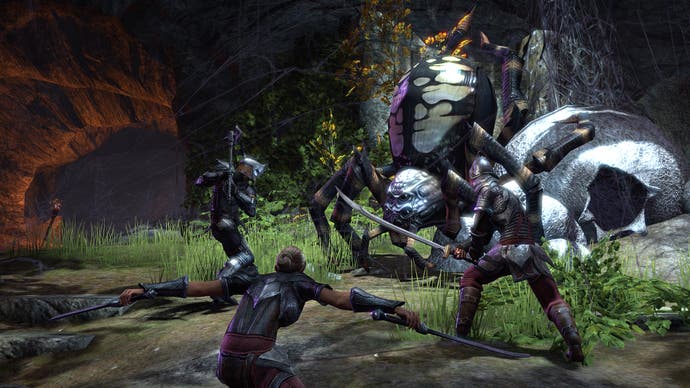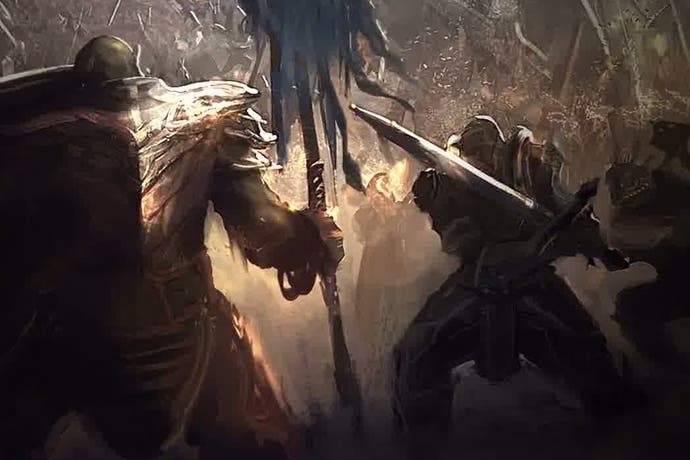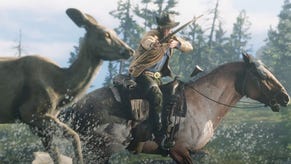Questing for freedom in The Elder Scrolls Online
A prisoner of tradition, a victim of heritage.
The words 'theme park MMO' get thrown around a lot these days, but rarely have they felt more apt than during my four hours with The Elder Scrolls Online. If Skyrim, Cyrodiil and so on are worlds, TESO smacks of the World Showcase from Disney's Epcot - familiar sights remade in fibreglass to be admired but never seriously mistaken for the original. Not as many gift shops. Far more spiders. This time, the park owners will actively block your path until you agree to sit through the local equivalent of "O Canada". Still, the comparison fits.
I'd love to be wrong about this, and a few hours clearly isn't anything like enough time to get the measure of a whole MMORPG. It, however, is plenty of time to be disappointed by its direction. It's not that TESO isn't polished, professional or well crafted - in most of the details, it's as strong and accomplished and well-crafted as anything else out there. From the sections I got to play and the higher-end content demoed though, it feels like an MMO given an Elder Scrolls makeover, not The Elder Scrolls reinvented as an MMO.
Expecting Skyrim-style world simulation, freedom, depth and player agency is unrealistic in a game that has to handle thousands of players messing around, and unless things change radically as the story progresses, TESO doesn't try for that. Its world has an empty vibe to it, with very little interaction density and quest-givers just sitting around holding out for a hero. For the Daggerfall Covenant faction's starting area, the island of Stros M'Kai, that means helping a group of pirates rescue kidnapped colleagues and stealing goodies that inevitably don't mean much booty despite you doing all the hard work.
Want to skip out on that and swim down to the Summerset Isles instead? Or cross the world to see if Vvardenfell needs a hand? Tough. You can't even leave the island until you've done a generic fantasy heist made ridiculous by seeing several other people simultaneously bopping around in the same disguise to raid the same lockbox. There are a couple of moral choices, and optional assignments like rescuing characters who reappear later on based on whether or not they're still busy being tortured, but TESO starts with the expectation that you'll be happy to follow its lead rather than forge your own path.

Obviously, this is just a start area - some restrictions are inevitable. Finishing didn't unlock the mainland though, just a second island - Bitnikh. This was every bit as linear, only this time the questing time was spent investigating cultists and being saddened that the Bitnikh guards don't actually deliver pompous poetry while arresting evildoers. Both locations could have been from any MMO, with nothing much off the beaten track save some glowy blue crystals called Skyshards that can be collected for bonus skill points, and picking fights with some oddly badass little mudcrabs.
At no point was the action bad, just not what's always made The Elder Scrolls series compelling. It's the 'safe' approach to questing (even if the response to games like The Old Republic has made it rather less safe of late) but not an obvious fit for this series. Radiant AI and Skyrim's generated quests are primitive, but surely they offer a more appropriate base to develop and refine for on-demand adventuring than serving up a hundred-hour dollop of scripted, single-player focused content that doesn't mind if you bring a friend along.
Stock as the core questing is, though, at least other areas get into the freeform spirit. Crafting offers tweakable recipes, and all players can get side gigs at the Fighter and Mages Guilds to help them out against Tamriel's current threat. Sadly though, would-be Thieves and Dark Brotherhood assassins will have to wait until after launch for their guilds to open branch offices.
Character customisation is the most interesting element, being more ability than class based. You do have to pick a class, like Sorcerer or Templar, but that just locks in three of your skill lines - important ones, yes, but still just three of many. Sorcerers, for example, are blessed with Daedric Summoning, Storm Calling and Dark Magic to develop. Everyone, however, can sneak like a rogue, use any armour or weapons, and earn esoteric skill lines like Vampire.
All characters are split into three factions but share a personal story. In Elder Scrolls tradition, you start out as a prisoner. Raising the stakes a little, this time it's as a prisoner of Molag Bal, Daedric Prince of domination, who also acts as the main game's villain - scheming to give heroes quick soulectomies and ultimately pull the whole of Tamriel into his miserable but at least correctly spelled domain of Coldharbour. This is where the key personal story quests happen, with more general ones restricted to your faction's third of the map.

Coldharbour wasn't ready to be played, although it looks suitably creepy - a miserable blue world of slaves and chains that we've yet to visit in the RPGs. Developer ZeniMax Online Studios promises that as important as the story is, it will end at level 50, clearing the slate for future additions. In the meantime, your lack of soul doesn't seem to be that much of a problem - it's mostly used to explain how you keep coming back to life, complete with Molag sometimes dropping in for a "MWAH-HA HA!" or a mocking taunt after death. Maybe at some point, we'll even get, "Hello, this is Clavicus Vile. Molly can't come to the phone right now, but he asked me to tell you he still thinks you suck."
After kicking Molag's Bals, a New Game Plus type option opens up, allowing access to harder, high-level versions of the other two factions' zones (populated by your side, via a story twist yet to be revealed) sprinkled with excellent endgame loot for solo players to pick up. In this way, one character can see all the solo content and everyone can acquire top gear via regular PvE. It's a clever idea, although earning top-tier loot this way is likely to be a lonely pursuit by the third and toughest run, with only each faction's most hardcore PvErs left for company. There'll be dungeons too, instanced and public. The developer wasn't ready to talk about raid-type content, however.
Combat is another highlight. The default is third-person and works well - fast, fluid, with direct targeting via reticule, and a heavy focus on reacting to characters' visual moves rather than relying on overt interface prompts. There's also due to be a first-person mode, with on-screen weapons, that looks like Skyrim. Unfortunately, it wasn't yet ready for outsiders to try.
I do have quibbles with the system, but liked it overall. As a long-time Elder Scrolls spellsword, I wasn't wild that the main schools of magic are stripped down to focus on "Destruction" and "Restoration", with point-bought skills in assorted categories rather than the series' usual magical setup. More positively, there are loads of them spread over the skill lines, and it's refreshing to see a game where magicka/stamina are the only limiting factors for their use, with no cooldowns, and a point per level to spend on the reservoir of your choice.
The proof will be in the blood pudding, but the pieces are definitely there to allow for plenty of character depth - not just being, say, a mage, but a mage that can directly trade survivability for firepower or vice versa, and where everyone can bring a wide range of skills to any encounter if they choose. These skills also level up individually. The more you use an attack, the better you get with it - and maxed out, all of them can be 'morphed' into one of two better ones. XP from success goes into a big pot, shared amongst your used skills.

Enemies too promise more complexity than most MMO targets. On its own, something like a wolf is just a pelt that doesn't know it's about to be sold to a junk vendor. Add another to the mix though, and one will slip into more of a support role for its partner. Humanoid enemies can go much further, of course, with an example shown being a fire mage and foot soldier working together - the soldier throwing down oil specifically for the mage to light up if you don't interrupt him first. Other demos included spiders eating their dead for an icky supercharge, cultists committing ritual sacrifice to summon a super-zombie, and spriggans empowering nearby wildlife instead of leading from the front.
These additions are interesting, and if what you want from The Elder Scrolls Online is a new MMO that evolves the usual formula a little in a new setting, then good news! There's nothing wrong with that, either. Tamriel is a fine world for adventuring, it'll be fun to see the likes of Skyrim in a different context, and the world being split into distinct thirds makes it unlikely everyone will end up with the same quests. What TESO wants to do, it will probably do fine.
Following this well-trodden road does still feel like a wasted opportunity though. Guild Wars 2 especially, while far from perfect or the MMO all others should be cloning instead, is a great demonstration of how much the genre can do when it's not shackled by tradition to the point of being oblivious to any alternatives. TESO isn't even finished yet, but it already feels old-fashioned.
Couldn't that be said of many MMOs? Sure. The Elder Scrolls will suffer more than most for it, though, simply because it's one of the few not simply spawned from a licence but a beloved set of actual single-player RPGs it has to compete with as well as complement. There's simply no way even the best essentially solo-with-friends questing is going to beat a game that can provide heroism without any compromises.
Going online offered a real chance to take the series somewhere truly new, where no other MMO has gone before or could even hope to venture. At the moment, while there are still many months left for The Elder Scrolls Online to impress, we're still waiting for signs that the chance has been seized.
This article is based on a press trip to the developer's offices in Washington DC. Bethesda Softworks paid for travel and accommodation.









